Infant School - Forest School
Where we explore and discoverFoundation Stage 1 - Year 2
The Forest School, which runs from Foundation Stage 1 to Year 2 (ages 3-7 years), focuses on leading learning through play in our state of the art Forest School environment. Students start their early education with a curiosity approach to learning, which continues into years 1 and 2. Learning throughout the Forest school promotes high levels of curiosity and independence.
As an accredited ‘The Curiosity Approach’ school, our Forest School provides opportunities for impactful learning whilst also developing curiosity, creativity, and holistic development. We foster imagination through natural materials, imaginative play, and a harmonious learning environment.
The natural environments on campus give students a chance to explore and discover as well as build resilience in their own learning. Our facilities include the Forest School, farm, hydroponics, indoor classroom environment and outdoor areas.
Our Forest School is a special place for our children where they are encouraged to test boundaries and explore taking risks in the great outdoors. The messy mud kitchen is a favourite attraction alongside other practical activities such as learning to cook, peeling vegetables and sawing wood which helps develop life skills and a growing sense of independence.
Please click the links below to view and download our Curriculum Handbooks:
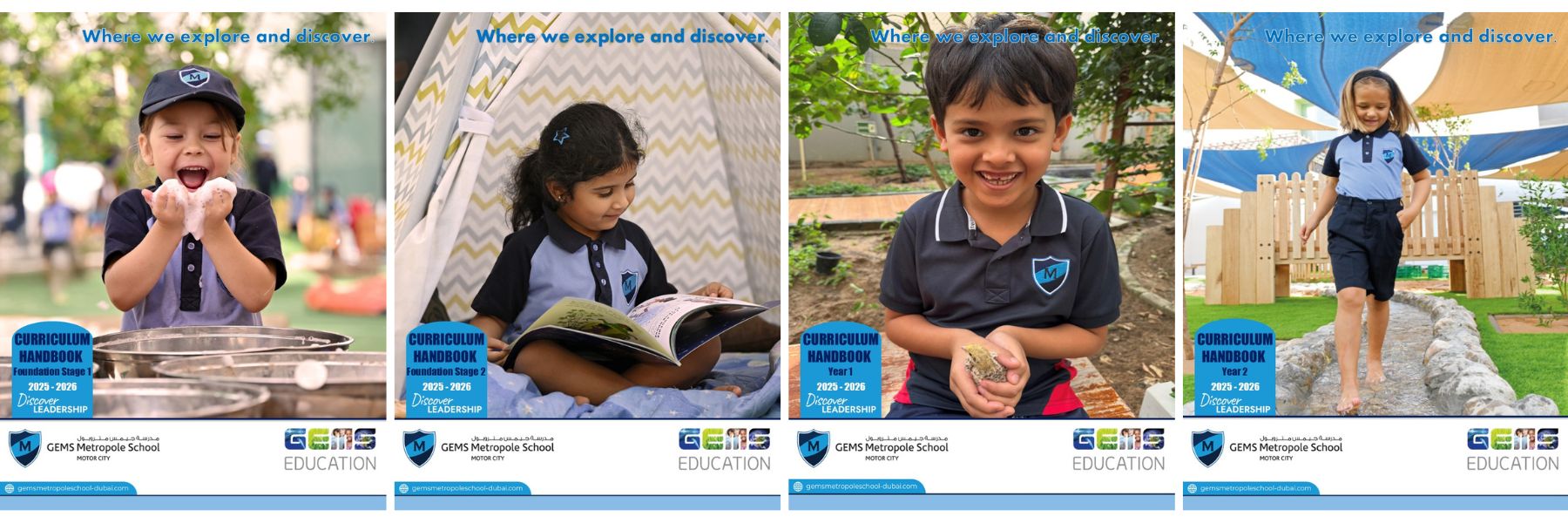
|
|


Emily Shepherd
Head of Forest School
Meet the Head of Forest School
"My name is Emily Shepherd, and I am delighted to introduce myself as the Head of the Forest School for FS1-Year 2. I am originally from Hampshire in the UK, but I have worked at GEMS Metropole for the past 6 years.."
Forest School
Throughout the academic Year, students across the forest school will learn a variety of skills and gain a great deal of knowledge and understanding as part of their Forest School lessons. Students will focus on developing communication and language, fine motor skills, inquisitiveness and risk-taking when exploring the natural environment around them. Students develop their listening skills by sharing a different story each week. They will have one focused session a week as well as access to the different outdoor areas every day, through other curriculum lessons which are specifically designed to make the most of these rich environments. Students will explore the forest school using the skills they have learnt in their forest school sessions. During the Forest School lessons, the students will begin to learn, with support, how to use tools safely, use natural resources to build dens for small animals, as well as creating natural artwork. The students also learn games to play with their friends.
Explore the Foundation Stage
EYFS Curriculum Overview
The EYFS curriculum is broken down into seven areas of learning and development. All areas of learning and development are important and inter-connected.
-

Communication and language
-
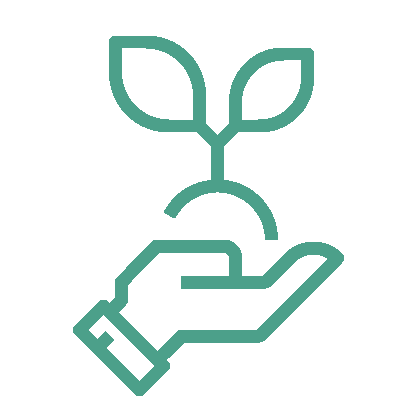
Physical development
-

Personal, social and emotional development
-
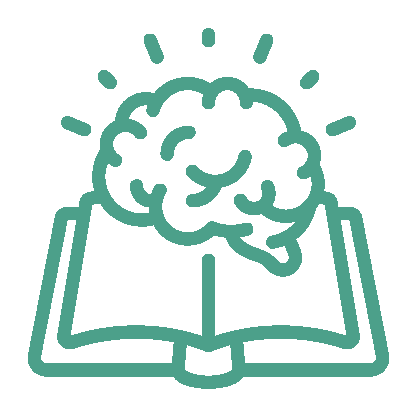
Literacy
-

Mathematics
-

Understanding the world
-

Expressive arts and design
-
Overview
We follow the Statutory Early Years Foundation Stage Framework.
Ongoing observation and assessment forms are a huge part of the EYFS experience and we send parents a half termly update of the observations of their children’s learning.
Communication and Language
At GEMS Metropole we ensure that our children are given the best opportunity to experience a language rich environment. We use talk in the classroom daily, to model and teach children how to widen their language as a means of communication.
Children are encouraged to speak in full sentences while using past, present and future forms accurately. Speaking to teachers and other children supports their oracy skills and children are then able to develop their own narratives and explanations.
Our highly qualified staff at GEMS Metropole ensure that children have the opportunity to refine and articulate their spoken language.
Personal, Social and Emotional Development
At GEMS Metropole we are exceptionally proud of the relationships that we have with both children and parents as we believe this builds the foundations to a successful learner.
Our high quality learning environments provide children with the resources they need to develop socially, independently and emotionally.In Continuous Provision children have ample opportunities to talk about their feelings and are taught how to play cooperatively with others by taking turns and working as part of a group.
Physical Development
At GEMS Metropole the outdoor learning areas provide ample opportunities for the children to not only develop physically, but also to incorporate and use all the skills they have been taught in the classroom.
Our outdoor environment is a palace where children can, explore and manage their own risks in a safe environment. GEMS Metropole has a bespoke sand area that has been designed to enable children the freedom to explore while having the space to develop their control and movements.
One of the areas we are most passionate about is being healthy. Children at GEMS Metropole are actively encouraged to bring a healthy lunch to school and our community rooms offer a sociable space for children to enjoy these.
Mathematics
At GEMS Metropole we provide children with a high quality learning environment that supports children with ample opportunities to develop and enhance their skills in counting, awareness of shapes, understanding numbers and number problems.
Staff use their knowledge and expertise to plan Mathematical activities, in and outside the classroom through practical hands on activities. In lessons we provide children with the opportunity to solve problems practically and with a purpose. Our highly skilled staff tailor learning to meet the needs of all children through addressing common misconceptions while supporting new concepts.
Literacy and Phonics
At GEMS Metropole we want our children to develop a passion for reading and writing for pleasure from the start. Our expectation is that children will leave the foundation stage unit with the strategies and skills to read and write simple sentences ready for them to build on these skills in Year 1. One of the first steps to enable children to access the joy of books is for them to learn the sounds associated with each letter and critical to this is the use of a structured phonics scheme.
Our children follow a bespoke synthetic phonics programme that has been tailored to integrate specific UAE links that are relevant and familiar to the children. The programme allows children to engage with phonics in a multi-sensory way using real life objects, play and rhyme. This systematic teaching of phonics, along with working in partnership with parents, really supports early reading and writing and provides children with a firm foundation on which to build.
Throughout school we use Talk 4 Writing to support early stages of writing and storytelling. Children are provided with text rich stories to support their oracy, imagination and creativity. Our aim is for children to verbally retell stories through images and symbols that they are able to process independently and in their own way.
Understanding of the World
At GEMS Metropole we are passionate about providing our children with the opportunity to observe objects and materials. Each classroom has been specifically designed to enable children the space to investigate and explore in a scientific way. Children are taught key skills in predicting, observing and evaluating to help them make sense of the world around them.
Throughout the Foundation Stage, our designated investigation areas provide children with open-ended opportunities to make links with other areas of the curriculum, while using the many resources that are readily available. We are exceptionally proud of how our children are able to find things out for themselves and then record this using pictures, short films and written work.
Expressive Arts and Design
Children at GEMS Metropole are encouraged to express themselves in a way that reflects their own personality. Children are exposed to a rich learning environment that encourages role-play, art and music.
In Foundation Stage our teachers, along with consultations with the children ,adapt the classroom environment regularly to support children's imagination. These adaptations encourage children to take on different roles where they fully immerse themselves in magical tales through dance and role-play.
-
Curriculum Overview
-
Foundation Stage 1: Term 1A
-
Foundation Stage 1 Term 1 B
-
Foundation Stage 1 Term 2 A
-
Foundation Stage 1 Term 2 B
-
Foundation Stage 1 Term 3 A
-
Foundation Stage 2 Term 1 A
-
Foundation Stage 2 Term 1 B
-
Foundation Stage 2 Term 2 A
-
Foundation Stage 2 Term 2 B
-
Foundation Stage 2 Term 3 A
-
Foundation Stage 2 Term 3 B
-
-
Foundation Stage Subject Coverage
Students at GEMS Metropole School are introduced to learning in a fun, welcoming and stimulating environment. At these early ages, children require a lot of care and support through which their curiosity can be nurtured.
The core academic areas of learning in Foundation Stage are:
FS1 and FS2
- Communication and language
- Physical development
- Personal, social and emotional development
- Literacy
- Maths
- Understanding the World
- Expressive arts and design
The learning of the core concepts of knowledge is achieved through both lessons and hands-on learning, with play and activities being essential components of our Foundation Stage students’ day.
-
Communication and language
Children are taught to listen attentively and to respond to the world around them with questions that are relevant. They are supported in feeling confident to speak in front of groups of people who are familiar to them, including their class as they move into FS2.
Environments are set up to encourage conversation between peers as well as adults in the classroom, extending their language as their variety of experiences increase.
Children are encouraged to express how they feel and use full sentences, extending their language with the help of modelling and support from the teacher and other adults.
-
Expressive arts and design
Children are taught to use a variety of tools in order to be creative and experiment with colour and textures. They are encouraged to share their process with others.
Opportunities for children to use role play and take on the different characters form narratives they have both made up or seen in the world around them are widely available in the environments.
The children have the opportunity to perform regularly, sing songs and move to music.
-
Literacy
In Literacy, children are exposed to a range of high quality stories and encouraged to speak about what has been read to them. They are also given opportunities to retell stories in the environment and use new vocabulary that they have learnt.
Children are given the chance to talk about key events that have happened in stories and anticipate what might happen.
By the end of the FS2 year, children read simple sentences out loud and can tell you what they have been read. They should do this independently.
In addition to the reading, children are taught to form recognizable letters and write simple phrases and stories.
-
Mathematics
Children in the foundation stage taught to have a deep understanding of numbers to 10. They are given opportunities to subitise numbers to 5.
By the end of FS2, children should be able to count verbally beyond 20. Through the environment and during teacher led sessions, children explore the values of numbers and compare quantities using mathematical language to say if it is the same, more or less.
Children explore patterns, including odd and even numbers as well as repeating patterns.
Mathematical facts such as doubles and halves are taught as well as how we can distribute objects evenly.
-
Personal, social and emotional development
Children are supported in understanding their own feelings as well as how those around them may feel. They are taught to regulate their feelings for different situations and encouraged to begin to be able to wait when an adult cannot respond to them straight away.
Children are taught to persevere through challenges and show independence, perseverance and resilience.
-
Physical development
Children develop their fine and gross motor skills through the foundation stage. They are provided with opportunities to move energetically, negotiating space and moving in a range of ways such as skipping, jumping and climbing.
In addition to large scale movements, children are also exposed to activities which support their fine motor skills such as using scissors, paintbrushes and cutlery.
-
Understanding the world
Children are taught to make observations of the world around them, coming on things that are the same and different. They use their experience and what they have learnt in class to make links to this. Children are exposed to understanding what life in like in different country as well as the one that they live in.
The environment promotes language for children to understand that states of matter as well as being able to comment on the seasons.
-
Explore the Infants
-
Spoken Language
At all ages, the ability to listen and respond appropriately to others is a critical life-skill and key to accessing and developing children’s learning in school and the world around them.
We use talk in the classroom daily, we model and teach children to articulate their answers, questions, opinions, arguments, descriptions and explanations, as well as express their feelings.
We encourage children to use the English language articulately in order to communicate with their audience effectively. We regularly use talk to clarify and solidify thinking and learning through cooperative learning structures in the classroom.
We provide real life contexts throughout the curriculum that provide opportunities for children to adapt their tone and style for a particular audience, from presentations to performances and role plays to debates. Talk is very much seen as a key to success.
-
Reading
At GEMS Metropole we have a passion for books and the written form; this is at the heart of our teaching from early reading until the children are ready for secondary school.
We believe that children must develop a love for reading in order to motivate and develop their own reading fluency and comprehension skills. Children at GEMS Metropole are able to access all that books have to offer through high-quality shared class texts and book talk that give them opportunities to develop their skills as well as a vivid imagination and advanced vocabulary. Children can choose their own book to take home from an array of individually levelled reading books, including books from the Oxford Reading Tree, ORT Phonics, Usborne First Reading and Project X reading schemes. This is encouraged across the school as the most useful and enjoyable element of home learning.
GEMS Metropole has three well-stocked libraries where children visit regularly and can relax and enjoy a book. Our children read regularly to teachers, learning support assistants and volunteers in a group or 1:1 environment, but also relish the opportunity to hear a magical tale read by their teacher.
-
Writing
At GEMS Metropole we value writing as a fundamental communication skill that enables our children to share their creativity, ideas and emotions; and this starts right from day one.
Children are given rich experiences in EYFS to encourage and develop a love and purpose for writing. In English lessons, we use high quality texts as a stimulus and as a model of writing excellence for them to emulate. Throughout the primary school we use Talk 4 Writing to support early stages of the writing process. This develops sentence structure, imagination and creativity through using images and symbols. Our aim is to make writing purposeful and meaningful so we will often link it to the current topic that our children are immersed in. Editing is an important skill our children develop, refining their work and striving for their absolute best to meet the needs of the audience is a key skill. We are exceptionally proud of what our children achieve and therefore celebrate their writing through publishing and displays.
-
Maths
The British Curriculum focuses on teaching of the following three fundamentals:
- Becoming fluent in the fundamentals of mathematics, including through varied and frequent practice with increasingly complex problems over time, so that pupils develop conceptual understanding and the ability to recall and apply knowledge rapidly and accurately.
- Reasoning mathematically by following a line of enquiry, conjecturing relationships and generalisations, and developing an argument, justification or proof using mathematical language.
- Solving problems by applying their mathematics to a variety of routine and non-routine problems with increasing sophistication, including breaking down problems into a series of simpler steps and persevering in seeking solutions.
Across the school, we teach Maths in a practical way giving children opportunities to explore number relationships using models, images and manipulatives including Numicon, Dienes and Cuisenaire Rods. Once children have a secure understanding of mathematical concepts, we challenge them to solve more abstract and complex problems through offering a variety of rich, mathematical tasks as opposed to moving them on to new content. Application in a range of concepts, reasoning and exploring mathematical ideas are a key part of learning and challenge for our children.
In lessons we link maths concepts to the real world beyond the classroom so that children develop an appreciation of the application of maths for future employment and real life. We don’t use a particular ‘maths scheme’ as such, but we do use a variety of published and online resources including White Rose. Our teachers are very skilled at structuring lessons and tailoring material to embed learning and provide stretch and challenge.
-
Science
Science at GEMS Metropole contributes significantly to pupils’ enjoyment and understanding of the world and their place within it. This awareness is to extend as far as the pupil is able from being aware of themselves and their immediate environment through to an appreciation of the natural and man-made world within Science. This area is important as it contributes to a broad, balanced, differentiated, and relevant curriculum but will also link across the curriculum.
Science is made accessible to all pupils through a focus on practical work, first-hand experience and special events designed to inspire and engage learners. Teaching key skills such as making observations, predictions and evaluation of first hand observations are of equal importance to knowledge and understanding.
In the primary school, science is taught by class teachers and is incorporated throughout other subjects and the relevant topic at the time. This ensures a holistic approach in the acquisition of scientific skills and knowledge.
-
Moral, Social and Cultural Studies (Year 2 only)
At GEMS Metropole we follow the Moral, Social and Cultural Studies (MSC) curriculum as published by the Ministry of Education in the UAE. This curriculum focuses on three domains; moral, social and cultural. There are 10 strands that fit into these domains; Character morality, individual and community, history, geography, sociology, economics, information literacy, information processing, heritage and civics. MSCs outcomes are incorporated across all areas of the curriculum from Year 2 to Year 6 for 40 minutes each week. In addition, some of the time will be integrated throughout discovery lessons when necessary. When teaching MSC, we aim to contribute to the making of better global citizens through the development of human capital capabilities, promoting the values of tolerance and respect and being responsible for looking after the place where they live as well as the wider world.
We provide students with an awareness of the world around them to help them navigate and be successful in the future, making informed and reasoned decisions as members of a tolerant and culturally diverse society. This will include deepening their understanding of social, political and economic systems. At the end of each term, students will complete a project to enhance their MSCs knowledge and skills.
-
Phonics and Early Reading
At GEMS Metropole, we believe that every child should have the opportunity to become a happy, fluent reader. The school offers a coherently planned sequence of lessons, based on Read Write Inc, that supports the effective teaching of phonics within the Foundation Stage, Year 1 and 2 and, where appropriate, in the Junior School.
Students develop the knowledge, skills and understanding to discriminate between and use auditory, environmental and instrumental sounds. Students are then introduced to phonemes/sounds and graphemes/letters systematically. They also learn to develop and apply blending and segmenting skills for reading and writing.
In Year 1 and 2, students are provided with opportunities to apply their phonics knowledge and skills as the main approach to reading and spelling. It focuses on phonetically decodable two-syllable and three-syllable words and the alternative ways of pronouncing and representing the long vowel phonemes. Furthermore, children will develop their ability to attempt to read and spell increasingly complex words. By Year 2, children begin to explore spelling patterns and grammatical concepts while also developing a breadth of knowledge, skills and understanding in the recognition and spelling of common exception words.
The teaching of phonics at Metropole intends to not only provide children with opportunities to develop the knowledge, skills and understanding essential for reading and writing, but also, to develop each child’s confidence, resilience and engagement in phonics lessons and a love for reading and writing.
-
Infant Subject Coverage
Year 1 and Year 2
Age: 5 years old and 6 years old
By Key Stage 1, students understand the concept of school and are prepared to learn; however, they are still at an age where they require support, as they begin to work out how they, as individuals with unique identities, fit into the world. So building friendships and self-confidence are important areas of development, alongside the traditional and necessary academic programme.
Year 1
Year 2
- English
- Mathematics
- Science
- Computing and Innovation
- Art and Design
- Design technology
- Performing Arts (music and drama)
- Physical Education (PE)
- Arabic
- Islamic Studies
- Sustainability
- Forest School
- English
- Mathematics
- Science
- Computing and Innovation
- Art and Design
- Design Technology
- Performing Arts (music and drama)
- Physical Education (PE)
- Arabic
- Islamic Studies
- Moral, Social and Cultural Studies
- Sustainability
- Forest School
Parent-Teacher-Student communication is of absolute importance, so school becomes an integrated part of student life.
-
Curriculum Overviews
More To Explore
-
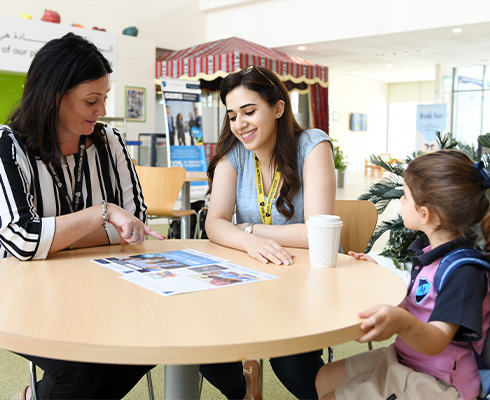
-
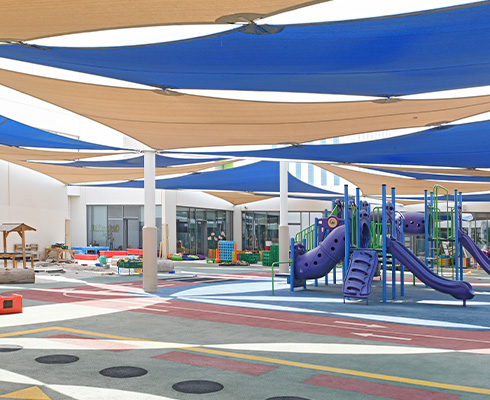
Facilities
We have a state of the art campus and facilities which create a rich learning environment.
-
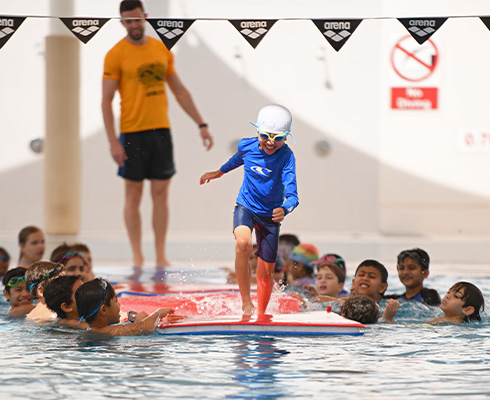
Extra Curricular Activities
We offer programs that introduce students to a variety of exciting and enriching experiences.
-
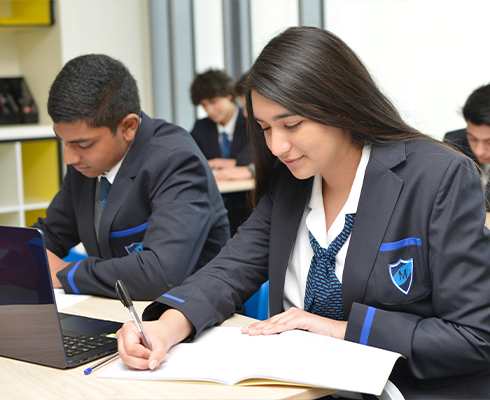
School Policies
Policies are important as they help a school establish rules and procedures and create standards of quality for learning and safety.
